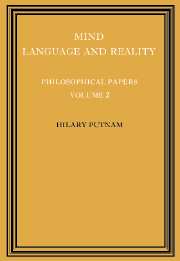Book contents
- Frontmatter
- Contents
- Dedication
- Introduction
- 1 Language and philosophy
- 2 The analytic and the synthetic
- 3 Do true assertions correspond to reality?
- 4 Some issues in the theory of grammar
- 5 The ‘innateness hypothesis’ and explanatory models in linguistics
- 6 How not to talk about meaning
- 7 Review ofThe concept of a person
- 8 Is semantics possible?
- 9 The refutation of conventionalism
- 10 Reply to Gerald Massey
- 11 Explanation and reference
- 12 The meaning of ‘meaning’
- 13 Language and reality
- 14 Philosophy and our mental life
- 15 Dreaming and ‘depth grammar’
- 16 Brains and behavior
- 17 Other minds
- 18 Minds and machines
- 19 Robots: machines or artificially created life?
- 20 The mental life of some machines
- 21 The nature of mental states
- 22 Logical positivism and the philosophy of mind
- Bibliography
- Index
9 - The refutation of conventionalism
Published online by Cambridge University Press: 12 January 2010
- Frontmatter
- Contents
- Dedication
- Introduction
- 1 Language and philosophy
- 2 The analytic and the synthetic
- 3 Do true assertions correspond to reality?
- 4 Some issues in the theory of grammar
- 5 The ‘innateness hypothesis’ and explanatory models in linguistics
- 6 How not to talk about meaning
- 7 Review ofThe concept of a person
- 8 Is semantics possible?
- 9 The refutation of conventionalism
- 10 Reply to Gerald Massey
- 11 Explanation and reference
- 12 The meaning of ‘meaning’
- 13 Language and reality
- 14 Philosophy and our mental life
- 15 Dreaming and ‘depth grammar’
- 16 Brains and behavior
- 17 Other minds
- 18 Minds and machines
- 19 Robots: machines or artificially created life?
- 20 The mental life of some machines
- 21 The nature of mental states
- 22 Logical positivism and the philosophy of mind
- Bibliography
- Index
Summary
I shall discuss conventionalism in Quine's writings on the topic of radical translation, and in the writings of Reichenbach and Grünbaum on the nature of geometry.
Let me say at the outset that Quine and Reichenbach are the two philosophers who have had the greatest influence on my own philosophical work. If Quine's ideas have not had the full influence they deserve, it may be in part because of the intensely paradoxical nature of the doctrines put forward – or seemingly put forward – in Word and Object. The doctrines of Word and Object – in particular the impossibility of radical translation – look wrong to many philosophers. Since these doctrines are thought by Quine himself to follow from the doctrines put forward in ‘Two dogmas of empiricism’, they cast doubt on ‘Two dogmas’ itself. My contention here will be that the impossibility of radical translation does not follow from the critique of the analytic-synthetic distinction. I believe that Quine is right in his critique of the analytic-synthetic distinction, but wrong in his argument for the impossibility of radical translation. By showing that one does not have to accept Quine's arguments for the impossibility of radical translation, I hope, therefore, to clarify just what it is in Quine's work that is true and important.
Similarly, I think that Reichenbach understood the importance of non-Euclidean geometry for epistemology as it has not been understood by philosophers in general to the present day.
- Type
- Chapter
- Information
- Philosophical Papers , pp. 153 - 191Publisher: Cambridge University PressPrint publication year: 1975
- 14
- Cited by



